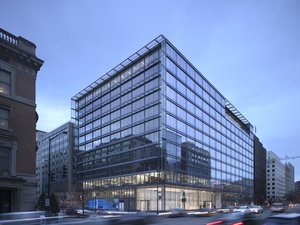Johns Hopkins University's campus is home to much more than just medical training, science classes and the world-renowned research the campus is known for.
Within the walls of the Johns Hopkins Tech Ventures building in East Baltimore, entrepreneurial minds are finding the support they need at the building's Social Innovation Lab.
Run by Darius Graham, the lab operates to serve two types of entrepreneurs: the students with ideas for new businesses, and Baltimore residents with ideas for how to best serve and improve their community or the world.
"While we're doing work that's really important and really valuable for the community, we're also helping [these entreprepeneurs] grow viable ventures," Graham said in an interview.
Social Innovation Lab is a part of a larger umbrella of programs that Johns Hopkins Tech Ventures operates — including the Fast Forward innovation hubs (part co-working, office and laboratory space), which will open its third space later this year; the mentors-in-residence program; the University Technology Showcase; a new legal support program, and many more.
For residents, the lab hosts an annual cohort of 10 socially minded entrepreneurs who mostly have ideas on how to positively impact their communities. Each year, they receive around 60 applications for the program that runs from November to April. Every accepted applicant receives $1,000 upfront, mentorship, weekly meetings with Graham, a weekly cohort meeting, pro bono law service and accountants and more. And, of course, at the end the program culminates in a Demo Day, of sorts, where each team presents their venture and one team walks away with a $25,000 prize.
Graham said in the most recent cohort, nine out of the 10 ventures were run by women and people of color. And most of the time, the founder has personally experience whatever issue they're out to solve.
For those who aren't accepted or can't commit fully to the program, SIL also offers a daylong innovation bootcamp one Saturday a semester that's open to anyone in the community. "We can only support 10 ventures, and we do that meaningfully, but we want to be able to help others, as well," Graham said.

And while Johns Hopkins is focused on bringing these resources and cohorts to Baltimore residents, the university is also providing the same resources to both undergraduate and graduate student entrepreneurs.
Whenever a student is interested in becoming a part of the Social Innovation Lab community, they set up a 30-minute meeting with Graham or the new student venture coordinator to discuss their venture. They want to see how much they've thought about it, how committed they are and just get a general sense of what the student is looking for from the lab. After that meeting, the student is added to the Social Innovation Lab email listserv and database. That's pretty much it—for students, the lab is what they make of it, Graham said.
Students have access to the physical co-working spaces, the same pro bono legal and accounting hours and anything else they seem to need. Most of the time, Graham says he hears students struggle to simply manage their time between course work, their entrepreneurial ventures and any other responsibilities they have.
"I'm really big into helping people look at themselves as change makers," Graham said. "I get a lot of emails that say 'I'm not sure if this is a good idea, if I should do this,' and the answer is always 'Yes.' Just make sure you're learning and being strategic about it."
One such venture that came out of the most recent Social Innovation Lab's cohort offerings is B360. Founded in 2016 by Baltimore resident Brittany Young, B360 aims to change the perception of engineers and dirt bike riders in the city. See, in Baltimore, dirt bike riding is pretty huge, and Young utilizes this interest to create an accessible way for students to learn about STEM using their bikes.
Between all of the 62 ventures that have gone through the cohort program, the alumni have raised more than $23 million collectively, hired over 350 people in paid positions and impacted more than 502,000 lives, according to SIL.
"Some of them continue, and some of them don't, and that's fine — especially since we're looking at students and they might want to do something else. That's part of the program, too," Graham said.
Moving forward, Graham is excited to see Hopkins continue to mission to be a leader of social innovation — and he sees the lab playing a huge role in that.
"Hopkins has really been a leader in developing medical innovation and other technologies, and what we want to see is those technologies and innovations are being brought to market in an impactful way," Graham said. "I think it really is that nexus of taking something out of the lab, out of the dorm room, out of the community member's office and providing mentorship to transform that into a product that really touches people."
"That's the mission we're all striving towards."
Images courtesy of Social Innovation Lab/Johns Hopkins University




